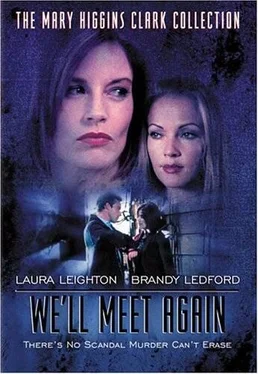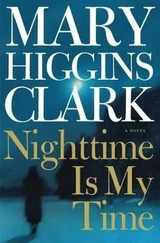“No, I don’t. Mrs. Branagan, are you off duty soon?”
“At two o’clock. This place clears out by then. Speaking of which, I guess I better take your order.”
Fran glanced at the menu. “A club sandwich and coffee would be fine.”
“I’ll put your order in right away, and if you don’t mind waiting, I’ll be glad to have a chat with you again later.”
Half an hour later, Fran looked about the coffee shop. It’s exactly as she said, she thought. You’d think there’d been a fire drill. The place was suddenly three-quarters empty. Both the clatter of dishes and the hum of voices had sharply diminished. Susan Branagan had cleared the table and promised to be back in a flash.
When she returned she was no longer wearing her volunteer’s apron, and she carried a cup of coffee in each hand. “Much better,” she said with a sigh, as she put the coffee down and settled into the chair opposite Fran. “As I told you, I love this job, but my feet don’t love it as much as the rest of me does. But you didn’t come here to talk about my feet, and I just remembered I’m due at the hairdresser in half an hour, so how can I help you today?”
I like this lady a lot, Fran thought. She doesn’t mind getting down to business. “Mrs. Branagan, you said the other day that you have your ten-year service pin?”
“That’s right. And, God willing, some day I’ll have my twenty-year pin.”
“I’m sure you will. I’d like to ask you about something that happened in the hospital a good while ago. It was actually a short time before Dr. Morrow and Dr. Lasch were murdered.”
“Oh, Ms. Simmons, so much happens here,” Mrs. Branagan protested, “I’m not sure I’ll be of any help.”
“You might remember this incident, though. Apparently a young woman was brought in after an accident she suffered while she was running, and she went into an irreversible coma. I’m hoping you might know something about her.”
“Something about her,” Susan Branagan exclaimed. “You’re talking about Natasha Colbert. She was in our long-term care residence for years. She died just last night.”
“She died last night!”
“Yes. It’s so sad. She was only twenty-three when she had the accident, you know. She fell while she was jogging and went into cardiac arrest in the ambulance. You know the Colbert family; they’re the ones who own the big newspaper chain, so they are very wealthy. After the girl had the accident, her mother and father donated the money for the long-term care residence and named it after her. Look across the lawn-it’s that lovely two-story building there.”
Cardiac arrest once she was in the ambulance, Fran thought. Who was the ambulance driver? Who were the medics? She’d need to talk to them. They shouldn’t be too hard to track down, though.
“Her mother collapsed when Tasha died last night. She’s here right now, and I understand she’s had a heart attack as well.” Susan Branagan dropped her voice. “See that good-looking man over there? He’s one of Mrs. Colbert’s sons. There are two of them. One of them is with her every single minute. The other one was down here for a bite to eat about an hour ago.”
If Mrs. Colbert dies from the strain of her daughter’s death, then she’s one more victim of whatever it is that’s going on here, Fran thought.
“It’s so painful for the sons,” Susan Branagan said. “Of course, for all intents and purposes, they lost their sister over six years ago, but still, it hits hard when the end really comes.” She dropped her voice. “I hear Mrs. Colbert went a little crazy after Tasha died. The nurse said she was screaming that Tasha had awakened from her coma and had spoken to her-which, of course, was absolutely impossible. She claimed Tasha had said something like, ‘Dr. Lasch, I tripped on my shoelace and went flying,’ and then, ‘Hi, Mom.’ ”
Fran felt her throat close. She could barely force out the words. “Was the nurse in the room with Mrs. Colbert at the time?”
“Tasha had a suite, and Mrs. Colbert had sent the nurse into the sitting room. She wanted to be alone with her daughter. But when Tasha died, Mrs. Colbert wasn’t alone. At the last minute the doctor got there. He says he heard nothing, and that Mrs. Colbert was hallucinating.”
“Who was the doctor?” Fran asked, although she was sure she already knew.
“The head of the hospital, Dr. Peter Black.”
If Annamarie’s suspicions were valid over six years ago, and if Mrs. Colbert was right about what happened last night, it sounds as if, after destroying Tasha, Black has continued experimenting on her, Fran thought.
Helplessly she looked across the room at the man Susan Branagan had pointed out to her. She wanted to rush over to him, to warn him that his mother was a danger to Dr. Peter Black, and that he should get her out of the hospital before it was too late.
“Oh, there’s Dr. Black now,” Susan Branagan said. “He’s going over to Mr. Colbert. I do hope it isn’t bad news.”
As they watched, Peter Black spoke quietly to the man, who nodded, got up, and began to follow him out of the room.
“Oh dear,” Mrs. Branagan said, “I just know it’s bad news.”
Fran did not respond. As he was leaving, Peter Black had spotted her, and they stared at each other. His eyes were cold, angry, menacing-certainly not the eyes of a healer.
I’ll get you, Fran thought. If it’s the last thing I ever do, I’ll get you.
Whenever a troubling situation reached crisis level, Calvin Whitehall had the enviable ability to eliminate every trace of frustration and anger from his mind. That ability was put to the test by the call he received from Peter Black at 4:30 that afternoon. “Let me understand,” he said slowly. “You are telling me that Fran Simmons was sitting in the coffee shop of the hospital, gossiping with one of the volunteers, when you went there to tell Barbara Colbert’s son that his mother had died?”
It was a rhetorical question.
“Did you then speak to the volunteer and ask her the exact nature of her discussion with Fran Simmons?”
Peter Black was calling from his library at home and holding his second scotch in his hand. “Mrs. Branagan was gone by the time I could decently leave Mrs. Colbert’s sons. I phoned her home every fifteen minutes until I got her. She had been at the hairdresser.”
“I am not interested in where she had been,” Whitehall said coldly. “I am interested in what she told Simmons.”
“They were talking about Tasha Colbert,” Peter Black said bleakly. “Simmons had asked her if she knew about a young patient at the hospital who had been in an accident and gone into an irreversible coma more than six years ago. Apparently Mrs. Branagan identified the patient for her and filled Simmons in on whatever knowledge of the events she had.”
“No doubt including Barbara Colbert’s statement that she had heard her daughter speak before she died?”
“Yes. Cal, what are we going to do?”
“I am going to save your skin. You are going to finish your drink. We are going to talk later. Good-bye, Peter.”
The click of the receiver being replaced was barely audible. Peter Black gulped down the remaining contents of his glass and instantly refilled it.
Calvin Whitehall sat nearly motionless for several minutes while he considered and rejected possible avenues to follow. After some time, he reached a decision, analyzed it thoroughly, and was satisfied that it would eliminate two of his problems- West Redding and Fran Simmons.
He dialed West Redding. The phone rang a dozen times before anyone answered.
“Calvin, I’ve been watching the tape.” The excitement in the doctor’s voice made him sound almost youthful. “Do you realize what has been achieved? What arrangements have you made for press interviews?”
Читать дальше












